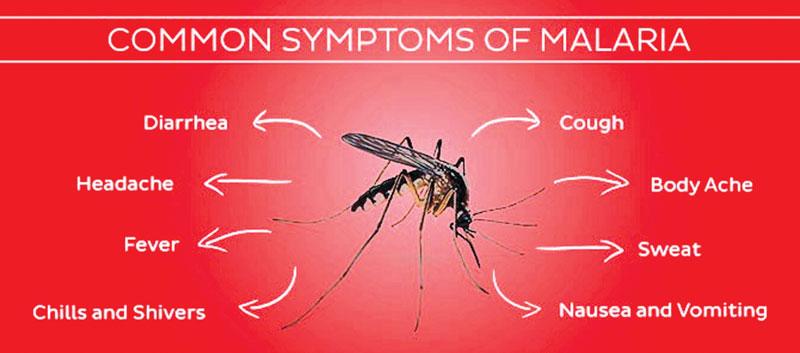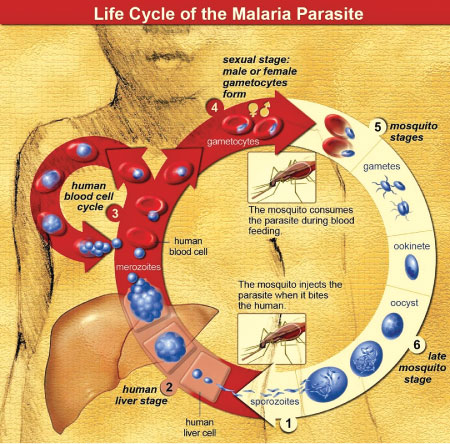
The unexpected discovery in December last year of a new invader mosquito from South India found in Mannar on an inspection by Entomological Assistants of the Anti Malaria Campaign (AMC), has led to fresh concerns among health officials battling to sustain Sri Lanka’s recently recognised status as a Malaria Free country by the world Health Organisation (WHO).
The malaria free status was achieved by disrupting the local transmission of parasites even though malaria vectors are there in the country. However, the detection of this new mosquito poses a serious threat to sustain the malaria free status due to the presence of vulnerable communities in MNN. These vulnerable populations in Mannar Island, include re-settlers from India with a potential of having malaria parasites in them, thus, providing a source of infection to mosquitoes which can spread the disease to others, health sources have pointed out. They said, while traditional mosquitoes which transmit malaria are present predominantly in rural areas, the new mosquito can also breed in urban areas in clean water settings although it belongs to the same mosquito group. Hence, the danger is that it can spread malaria to other parts of the country, including major cities, causing a re-emergence of local transmission.The Sunday Observer spoke to two eminent experts in Malaria control, Director, Malaria Control Unit, Dr Hemantha Herath and Dr Dewanee Ranaweera, Consultant Community Physician to find out more about the invader mosquito and how it can impact on our health.
Excerpts
 Q. A senior professor at the Kotalewela Academy , Prof. Wimaladharma Abeyewickreme, was recently quoted as saying that there was an urgent need to control a new invader malarial vector from S. India. I understand Sri Lanka was given a malaria free status by the World Health Organisation ( WHO) in September 2016. Yet, barely three months later, this invader mosquito was detected in Mannar in December 2016. What is this new mosquito? Does it belong to the same Anopheles mosquito group that cause malaria?
Q. A senior professor at the Kotalewela Academy , Prof. Wimaladharma Abeyewickreme, was recently quoted as saying that there was an urgent need to control a new invader malarial vector from S. India. I understand Sri Lanka was given a malaria free status by the World Health Organisation ( WHO) in September 2016. Yet, barely three months later, this invader mosquito was detected in Mannar in December 2016. What is this new mosquito? Does it belong to the same Anopheles mosquito group that cause malaria?
A. The new mosquito is called Anopheles stephansi which is prevalent in India and some other countries. It was found in wells in Mannar Island during the mosquito surveillance activities of Anti Malaria Campaign (AMC).
This was labelled as an invasive mosquito since it was not detected in Sri Lanka previously and it has the potential to cause serious health, economic and environmental hazards in Sri Lanka.
Q. What does this discovery signify in terms of Sri Lanka’s status as a malaria free country?
A. The detection of the new vector does not mean the malaria - free status in Sri Lanka is disrupted. The malaria free status was achieved by disrupting the local transmission of parasites even though malaria vectors are there in the country.
However, the detection of this new mosquito poses a serious threat to sustain the malaria free status due to the following reasons:
- There are vulnerable populations in Mannar Island including re-settlers from India with a potential of having malaria parasites in them, thus, providing a source of infection to mosquitoes which can spread the disease to others.
- Traditional mosquitoes which transmit malaria are present predominantly in rural areas.
- This new mosquito is a very effective vector in transmitting malaria. Though it belongs to the same Anopheline group that cause malaria it can breed in urban settings in clean water containers.
- In summary, this mosquito can breed in almost similar breeding grounds as the dengue mosquito. Currently, most of our imported malaria cases are reported from urban areas. Thus, if this mosquito spreads beyond Mannar Island there is a serious threat of spreading malaria in the country even to major cities.
Q. How does it infect humans? Explain in detail.
A. Like other mosquitoes that spread malaria, if this mosquito bites a human infected with malaria, the malaria parasite enters into the mosquito and when the mosquito bites another person it can transmit the parasite to that person.
Even though currently there is no malaria transmission in the country there are vulnerable populations in the country .
Q. .Do the Plasmodia spores from mosquito saliva infect everyone the mosquito bites?
A. Once a mosquito gets Plasmodia spores, parasite has to multiply within the mosquito to infect another person. The appearance of symptoms in the person may depend on the load of parasite inserted, immunity of person, etc. However, each infected mosquito bite has the potential to infect everyone the mosquito bites.
Q. What organs in the body are infected initially?
A. Predominantly, the parasite lives in the blood but it enters the liver as well. Some types of parasite can affect virtually any organ in the body causing severe disease and even death.
Q. How long does it take for the female malaria parasite inside the mosquito to reach sexual maturity?
A. Duration can vary but in general mosquito cycle takes two weeks.
Q. After how many days will it take to infect the human body?
A.. After an infected mosquito bites it takes about 7-10 days to develop symptoms in humans, in general. However, in some parasite types it takes longer.
Q. Does everyone who is bitten by the same mosquito get infected?
A. As mentioned above, everybody who is bitten by the same mosquito has the potential to get infected.
Q. What are the early symptoms to look for?
A. Fever is the most common manifestation, but people can present with other vague symptoms such as, nausea, vomiting, headache etc. Some may present with complications such as, altered level of consciousness, kidney failure, and shock, if diagnosis is delayed. Some may be asymptomatic.
Q. Is malaria curable? How?
A. Yes, if detected early and proper treatment given.
Q. Are they accessible to all vulnerable communities? Who are these communities ?
A. Yes. These days we consider all the people who travel to malaria endemic countries as vulnerable communities. Some of these groups include: Businessman/traders/pilgrims who travel to India / other malaria endemic countries, gem traders going to Mozambique and Madagaskar, Sri Lankan military personnel returning from UN peace-keeping missions, migrant workers/refugees from neighbouring countries, Sri Lankans returning from leisure trips in Africa and South /East Asia, and tourists coming through other endemic countries in Asia or Africa.
Q. Is it preventable? Is there a vaccine? Or drugs to be used prior to developing the diseases> Explain.
A. Yes it is preventable. Vaccines are still under development. It can be prevented by avoiding mosquito bites and taking preventive medicines when travelling to a malaria endemic country. The preventive medicine has to be started at least one week before leaving to the country, Please contact AMC for more details;AMC hotline – 0117 626 626AMC general- 011 2588408
Q. At present do you have any new cases of local transmission of malaria?
A. No local transmission since November 2012.
Q. Is there a risk of the re-emergence of malaria through ‘imported’ cases of malaria coming into the country from other countries where vectors are still present? What are the countries that are now on a high risk list?
A. Yes, there is a high risk of the re-emergence of malaria through ‘imported’ cases since there are vector mosquito in most parts of the country. Many Asian, African and Latin American countries are at risk of having malaria.
Q. I understand that despite all the awareness programs conducted by the Anti Malaria Campaign and the Health Ministry, studies have revealed that awareness among the people and even the relevant authorities, of the existence of this new threat is still very poor. I also understand that there were protests against the AMC vector control activities in Mannar Island, to cite an example. Elaborate.
A. This is natural when new health problems are encountered and it can be mitigated through proper public awareness and advocacy to authorities. We request the support of media to create this awareness.
Q. What is the AMC doing to fill this gap?
A. We are working with different stakeholders such as political leaders, provincial health authorities, District Secretary and security forces, to fill this gap. Through these programs we have already gained a good momentum though we have occasional drawbacks.
Q. What is your end goal for completely eradicating any future threat of malaria? What kind of activities do you have in mind for this?
A. Sri Lanka has eliminated malaria from its soil and we have to continue to monitor and take preventive measures to stop any re-introduction until the world eradicates malaria. Some of the activities the AMC is currently carrying out to curtail the risk are mentioned below:
- Providing preventive treatment for malaria
- Early detection and prompt treatment of malaria cases
- Providing the required diagnostic and treatment facilities and training
- Screening high risk personnel entering Sri Lanka from malaria endemic countries at ports of entries
- Screening high risk populations in the country, workers, returnees and refugees from malaria endemic countries.
- Mobile clinics, blood bank screening and screening anti natal mothers.
- Mosquito surveillance
- Selective vector control
Q. Your word of advice to the public at risk
.A. a) To the general public my advice is: Take preventive measures when travelling to a malaria endemic country including taking preventive medicines, and take measures to avoid mosquito bites. Test for malaria if you have fever and have travelled to a malaria endemic country within one year
b) To the public in Mannar area, please co-operate in the activities of AMC since all our activities are based on well accepted safe interventions. Willing cooperation will benefit them as well as the country
c) To clinicians, get a travel history from all malaria patients and if positive, test for malaria. Remember low platelet is very common in malaria (as well as dengue)
